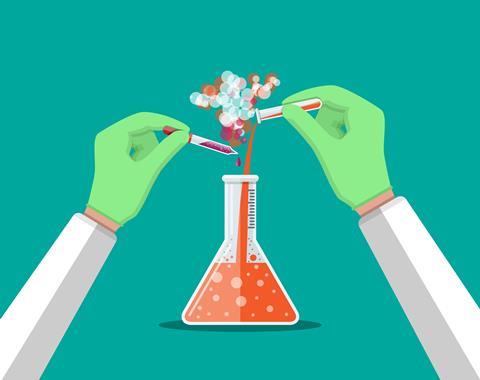Practical work is essential for a good science education and a recent study details what is needed for world-class laboratory experiences. Vikki Cantrill looks into the priority recommendations for schools.

Practical laboratory science is a great way to motivate and engage young minds. Hands-on experiments are an essential part of learning science and a way to develop wider life skills.
But what should ‘good’ practical science look like in today’s secondary schools and how might school leaders or heads of department develop their own programmes?
The Gatsby charitable foundation set out to determine what makes practical science effective in schools, and provide a framework and criteria to help schools develop policies and deliver world-class experiences.
The study involved an in-depth look at high-performing schools from around the world and a national consultation. The resulting report, Good Practical Science [pdf] published in September 2017, identifies 10 benchmarks for good practical science and specific criteria to meet them. Three benchmarks are highlighted as particularly important: planned practical science; expert teachers; and technical support.
Good planning with technical backing
The first benchmark recommends every school has a written policy that explains why teachers use practical science and the outcomes they expect from it. The policy, ideally drawn up by teachers and technicians across the science department and reviewed regularly, should detail how different age groups and pupils with special educational needs and disabilities are accommodated. It should also explain how to make the most of opportunities offered outside of school.
Teachers should have subject-specialist training that is maintained by continued professional development (CPD) in the subject and age range they teach, along with specific training in practical science, according to another benchmark. Tonicha Davies, Head of Science at Cullompton Community College agrees: ‘I think having a focus on practical work in department meetings, both in sharing good practice and skilling-up staff that are less confident in a particular field is really important’. Good training ensures that teachers can carry out practical science with confidence and with knowledge of the underlying principles.
Excellent technical staff should support these well-planned programmes. All science departments should employ enough technicians with expertise covering biology, chemistry and physics to allow teachers to incorporate practical work into lessons. Technical staff should also have access to regular CPD.
These three main aims achieved, schools will be well on their way to offering top-quality practical education.
Ambitious targets
However, a broad survey showed English schools fall short of meeting all of the criteria associated with the benchmarks. Indeed 36% of schools didn’t meet any of the criteria and no school achieved more than seven of the 10 benchmarks. But the encouraging news is many schools are on their way to achieving the benchmarks, even if they are not fulfilling all the criteria.
Practical classes help pupils improve their understanding of a subject and develop higher skills, like communication and teamwork, which are important later in life. ‘The UK needs more scientists… and practical science shows students at first-hand how scientists and technicians work. It engages students to follow science further, on academic or technical routes’, says Sir John Holman, author of the report and president of the Royal Society of Chemistry.
But schools in England are under intense pressure to perform in written exams, which puts practical lessons at risk and sees their frequency noticeably decline for post-16 students. So recommending half of classes should include practical work seems ambitious. ‘We’re pretty good in our school and it is definitely over a third, but probably not half’, says Tonicha, who likes the expectation students’ practical work is assessed and tracked. ‘This is particularly important in light of the new GCSEs and the demands on the assessment of practical science in the exams’, she adds.
Finally, Sir John’s report urges school leaders to make the most of what they have, and look after valuable staff members. Good recruitment, retention, and CPD should ensure a better proportion of science subject specialists within a given science team. In particular, the role that technicians play is stressed. The report notes ‘the UK has some of the best technician support we have seen anywhere, and this should be conserved and used to its full potential’.
The Good Practical Science benchmarks
1. Planned practical science
Write a policy that explains why teachers use practical science, the outcomes they expect from it and how they achieve those outcomes.
2. Purposeful practical science
Know the purpose of any practical science activity, and plan and executed it so it is integrated with other science learning.
3. Expert teachers
Provide subject- and age-specialist training, so teachers can carry out practical science with confidence and knowledge of the underlying principles.
4. Frequent and varied practical science
Provide practical activity in at least half of science lessons. These can be short or long, but should be varied.
5. Laboratory facilities and equipment
Schools should have enough well-equipped laboratories for every teacher to do frequent practical science safely.
6. Technical support
Departments should have enough technical or technician support for teachers to carry out frequent and effective practical science.
7. Real experiments, virtual enhancements
Use digital technologies to support and enhance practical experience, but not to replace it.
8. Investigative projects
Create opportunities for open-ended and extended investigative projects.
9. A balanced approach to risk
Unnecessary risk aversion should not restrict students’ experiences.
10. Assessment fit for purpose
Formative and summative assessment should include assessment of their practical knowledge, skills and behaviours.
For more detail, visit Good Practical Science.
Vikki Cantrill is a freelance writer and editor based in Cambridge, UK and tweets @Vikki_Cantrill









No comments yet